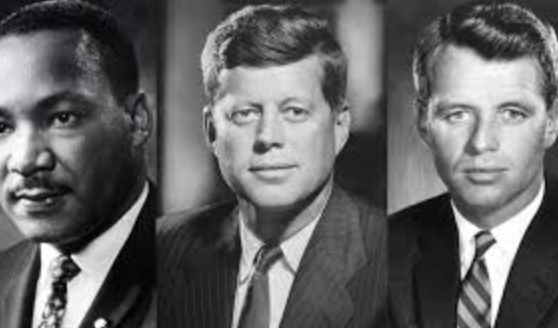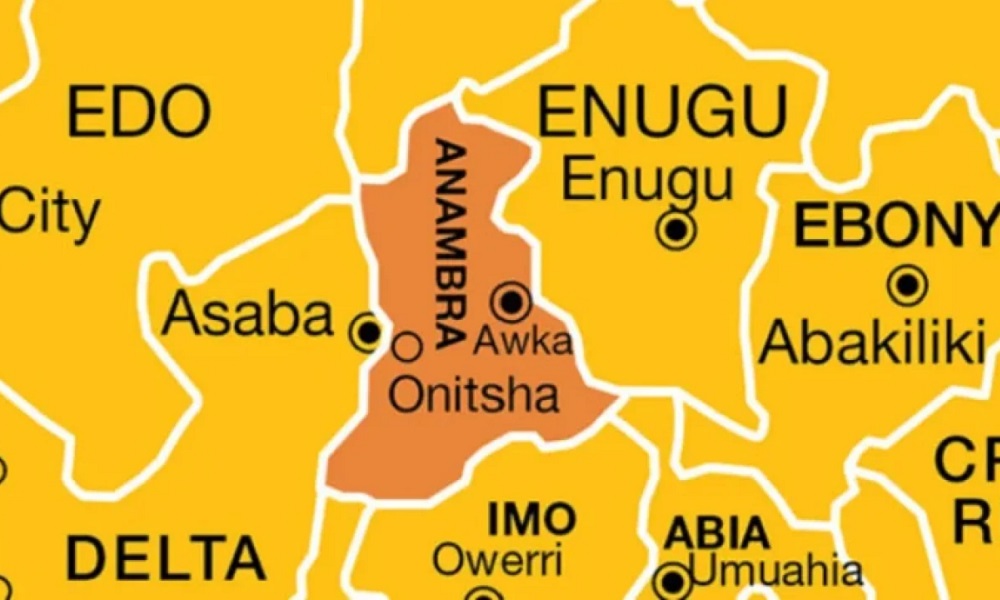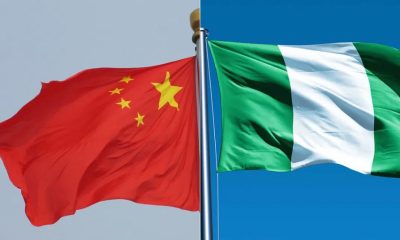News
Trump’s declasification of JFK, MLK assassination files opens window into US most shocking crimes

By Kayode Sanni-Arewa
A trove of long-classified government documents concerning some of the most politically charged killings in modern American history — including the assassination of former President John F. Kennedy — could finally be made available to the public.
But that’s just the start of the latest saga surrounding the killings, which have sparked fascination, conspiracy theories, and history-changing debate for decades.
President Donald Trump signed an executive order Thursday aimed at declassifying government documents related to the assassinations of former President John F. Kennedy, his brother and presidential candidate Robert F. Kennedy, and civil rights icon Martin Luther King Jr. The order essentially requires the nation’s security organizations to create plans to release the records.
The full findings of the government investigations into the three killings have been hidden for decades, sparking wide-ranging speculation and preventing a sense of closure for many Americans. All three men were national and international icons whose assassinations — and the theories swirling around them — became the stuff of books, movies, controversy, and the pages of history itself.
“A lot of people were waiting for this . . . for years, for decades,” said Trump in signing the release of the documents. “Everything will be revealed.”
JFK assassination, Nov. 22, 1963
The shock of President John F. Kennedy’s assassination in 1963 still echoes more than half a century later.
Kennedy, known for both his glamour and steering the country through the closest it ever came to nuclear war, was assassinated in Dallas, Texas. He was shot and killed as his presidential motorcade brought him along a downtown city street and as he waved to adoring bystanders from the open-roofed car.
Police arrested Lee Harvey Oswald less than an hour later. But Oswald himself was killed on live TV just two days later as police were transferring him to a county jail.
Oswald’s killer, Jack Ruby, acted alone on an impulse, the President’s Commission on the Assassination of President Kennedy, known as the Warren Commission, concluded. The commission ruled that Oswald also acted alone.
The JFK assassination sent the nation into mourning and shook it to its core, as Americans searched for answers. Hundreds of books have been written and documentaries produced, with bits and pieces of information emerging to this day.
Many regard the commission’s work as a government-orchestrated coverup and doubts have been raised over who killed John F. Kennedy have persisted. Conspiracy theorists lay the blame on everyone from Cuba – at the heart of the nuclear missile crisis – to the CIA itself.
The wide-ranging theories over Kennedy’s death – how many shooters were involved, how many bullets – became so ingrained in popular culture that they made it onto the comedy series Seinfeld.
MLK assassinated in Memphis, April 4, 1968
King, whose work furthering the Civil Rights Movement is honored with a federal holiday, was killed on the balcony outside his motel room in Memphis, Tennessee.
The Atlanta preacher was visiting the city to march alongside striking workers. On the evening of the assassination, he was preparing to leave for dinner at the home of a local minister.
He stepped outside to speak with colleagues in the parking lot below and was shot in the face by an assassin. James Earl Ray, a 40-year-old escaped fugitive, later confessed to the crime and was sentenced to a 99-year prison term.
But Ray later tried to withdraw his confession and said he was set up by a man named Raoul. He maintained until his death in 1998 that he did not kill King.
A Memphis tavern owner and a former FBI agent both also claimed a figure named Raoul was behind the killing, according to the Department of Justice.
Loyd Jowers, a former Memphis tavern owner, claimed 25 years after the murder that he participated in a mafia-linked conspiracy to kill King. Jowers also linked Memphis police and Raoul to the assassination, the Justice Department said.
Donald Wilson, a former FBI agent, also claimed in 1998 that after King’s assassination he found some papers in Ray’s car that mentioned Raoul as well as figures linked to the Kennedy assassination.
Wilson said the papers were stolen from him by someone who later worked in the White House, according to the Justice Department.
RFK killed in Los Angeles on June 5, 1968
Robert F. Kennedy never achieved the political heights of his older brother. But he was no less a beloved figure for his championing of civil rights.
He served as his brother’s attorney general and as a senator. He was killed in Los Angeles where he had gone for the California Democratic primary, just months after declaring his presidential candidacy.
The younger Kennedy spent the evening of the election at a suite at the Ambassador Hotel awaiting election results. He eventually went down to a hotel ballroom to thank supporters, then went through the hotel kitchen after being told it was a shortcut to a press room.
An assassin, Sirhan Sirhan, killed him as he shook hands with a hotel busboy. Sirhan remains in prison.
But some believe the same elements behind the older Kennedy’s assassination also killed the former senator.
The presidential candidate’s son Robert F. Kennedy Jr., Trump’s pick to run the Department of Health and Human Services, has long maintained that Sirhan didn’t even shoot his father. The Trump cabinet pick believes Sirhan missed and that instead his dad was shot by a man linked to the CIA.
News
EU leaders meet in Ukraine demand Russia’s unconditional 30-day ceasefire

In a significant diplomatic push on the ongoing Russia-Ukraine war, European leaders convened in Ukraine’s capital, Kyiv on Saturday, where they called out Russian President, Vladimir Putin, to agree to a 30-day unconditional ceasefire.
The European leaders threatened “massive sanctions” if Moscow fails to comply with their demand, according to Al Jazeera.
French President, Emmanuel Macron, German Chancellor, Friedrich Merz, and British Prime Minister, Keir Starmer, travelled together by train from Poland to Kyiv, later joined by the Polish Prime Minister, Donald Tusk.
The visit marked the first joint mission by leaders of these four European nations to Ukraine.
In a joint press conference with Ukrainian President, Volodymyr Zelenskyy, the leaders underscored their unified demand for an immediate halt to hostilities.
The proposed ceasefire, covering land, sea, and air operations, is seen as a critical step toward ending the three-year conflict.
Macron warned that the European bloc is prepared to escalate sanctions, specifically targeting Russia’s energy and banking sectors, should Putin refuse the proposal.
He also floated the idea of deploying foreign troops as a reassurance measure, saying, “The United States would take the lead in monitoring a proposed ceasefire, with support from European countries.”
Starmer delivered a sharp rebuke, stating, “Only one country started this illegal conflict, and that was Russia and Putin, and only one country stands in the way of resolving it peacefully, and that is Russia and Putin.”
Zelenskyy’s chief of staff, Andriy Yermak, highlighted the visit’s significance, saying, “There is a lot of work to do, a lot of topics to discuss.
“We must end this war with a just peace. We must force Moscow to agree to a ceasefire,” Al Jazeera reports.
Meanwhile, the Kremlin dismissed the European leaders’ demands, describing it as confrontational.
Russian spokesman Dmitry Peskov reportedly said, “We hear many contradictory statements from Europe.
“They are generally confrontational in nature rather than aimed at trying to revive our relations. Nothing more.”
The call for a ceasefire is also backed by U.S. President Donald Trump, who has proposed the 30-day halt as a foundation for peace negotiations.
However, Putin has so far resisted international pressure.
Ukraine’s Foreign Minister Andrii Sybiha reiterated Kyiv’s readiness, saying, “Our country and its allies are ready for a full, unconditional ceasefire with Russia for at least 30 days starting on Monday.”
The visit came a day after Putin struck a defiant tone during a military parade in Moscow commemorating the 80th anniversary of World War II victory, underscoring the entrenched tensions.
Al Jazeera’s Zein Basravi, reporting from Kyiv, noted that while the visit was “symbolic,” it also involved practical efforts to ensure U.S. engagement in future peace talks.
After the meetings, Ukraine’s Ministry of Foreign Affairs confirmed that the five leaders held a phone call with Trump to coordinate their peace strategy.
Sybiha emphasized on X, “If Russia agrees and effective monitoring is ensured, a durable ceasefire and confidence-building measures can pave the way to peace negotiations.”
The leaders issued a joint statement stressing their commitment, saying, “Alongside the US, we call on Russia to agree [to] a full and unconditional 30-day ceasefire to create the space for talks on a just and lasting peace.
“We are ready to support peace talks as soon as possible, to discuss technical implementation of the ceasefire, and prepare for a full peace deal.”
They noted, “The bloodshed must end, Russia must stop its illegal invasion, and Ukraine must be able to prosper as a safe, secure and sovereign nation within its internationally recognised borders for generations to come.”
News
NDLEA nabs Iran-bound woman with cocaine in private part, stomach, bag at PH airport(Photos)

. ..arrests 22-year-old British ex-convict with large drug shipment at MMIA; intercepts fuel tanker, 3 vehicles with 3, 047kg skunk in Niger, 775 litres of codeine in Kano
Desperate attempt by a woman, Ihensekhien Miracle Obehi who disguised with hijab to export large consignments of cocaine concealed in her private part, stomach and false bottom of her handbag to Iran has been thwarted by operatives of the National Drug Law Enforcement Agency (NDLEA) at the Port Harcourt International Airport, Port Harcourt, Rivers state.
Obehi who was dressed in hijab to beat security checks was intercepted at the departure hall of the Port Harcourt airport on Sunday 3rd May 2025 while trying to board a Qatar Airline flight to Iran via Doha following credible intelligence. During her search, she was found to have inserted three wraps of cocaine in her private part, and two large parcels hidden in false compartments of her handbag while she swallowed 67 pellets of the Class A drug.
As a result, she was placed under excretion observation and after four excretions that lasted days, she expelled the 67 wraps of the substance in her stomach. She claimed she was to swallow 70 pellets of cocaine but after ingesting 67 pieces she could no longer swallow the remaining three and decided to insert them into her private part. The total weight of the three consignments hidden in different parts of her body comes to 2.523 kilograms.
In like manner, NDLEA operatives at the Murtala Mohammed International Airport, MMIA, Ikeja Lagos on Friday 9th May intercepted a 22-year-old British national, Campell Kaizra Kofi Johannes Slifer coming from Thailand through Doha on Qatar Airways flight with two suitcases loaded with 35 parcels of Loud, a strong strain of cannabis weighing 37.60kg.
Campell who claimed he had twice been convicted in the UK for drug trafficking and robbery, said he was recruited in London to travel to Thailand to pick the illicit consignment and bring same to Nigeria.
In Niger state, NDLEA officers acting on intelligence on Wednesday 7th May intercepted a fuel truck marked ABJ 693 XU and three other vehicles loaded with 246 bags of skunk, a strain of cannabis with a combined weight of 3, 047 kilograms along Suleja-Kaduna road. Four suspects arrested with the exhibits include: Christopher Onyema, 47; Benedict Etineruba Young, 54; Chukwudi Ujue Jerry, 30; and Mohammed Abdullahi Danasabe. Apart from the fuel truck, three other vehicles recovered from the suspects include: Honda Odyssey bus marked YAB 667 CZ; Gulf bus with registration number GWA 125 TQ and
Honda Odyssey bus marked ABJ 230 CN.
At Oja Amukoko in Ijora area of Lagos, two suspects: Eze Chekube Emmanuel and Ike Samuel Chinyerem were on Thursday 8th May arrested by NDLEA operatives with a total of 109,914 pills of tramadol, swinol and nitrozepam seized from them.
While 52.5kg skunk was recovered from two suspects: Lukman Sabo Umar, 23, and Tukur Ammadu, 20, in a bus at Gwantu, Sanga LGA, Kaduna State on Tuesday 6th May, NDLEA operatives on patrol along Bode Saadu- Jebba expressway, Kwara State on Monday 5th May
arrested Rufai Nasiru with 45,400 pills of tramadol 225mg.
In Bauchi state, NDLEA officers on patrol along Bauchi-Gombe road on Tuesday 6th May intercepted a Toyota Tundra jeep marked RBC 111 DW conveying 526 blocks of skunk weighing 505kg with two suspects: Isaac Onogure, 37 and Ikechukwu Peter, 44, arrested.
A total of 31 kegs containing 775 litres of codeine syrup were recovered from two suspects:
Hafizu Isa Uman, 34, and Ismail Shehu, 48, when NDLEA operatives raided their hideout at Rijiyar Zaki area of Kano on Saturday 10th May, while 1.1kg of Loud consignment concealed in pillow coming from Thailand was on Tuesday 6th May intercepted by NDLEA officers at a courier company in Lagos.
The War Against Drug Abuse, WADA, social advocacy activities by NDLEA Commands equally continued across the country in the past week. Some of them include: WADA sensitization lecture delivered to students and staff of Federal Government College, Sokoto; Deeper Life International College, Nteje, Anambra; Martins Sanda Girls Science College, Paikoro, Niger state; Restoration Power International School, Idua Eket, Akwa Ibom; while Oyo state command delivered WADA enlightenment lecture to members of the League of Imams and Alfas at Iseyin Central Mosque, Iseyin, among others.
While commending the officers and men of DOGI, MMIA, PHIA, Lagos, Kano, Kaduna, Bauchi, Kwara, and Niger Commands of the Agency for the arrests and seizures of the past week, Chairman/Chief Executive Officer of NDLEA, Brig. Gen. Mohamed Buba Marwa (Rtd) equally praised their counterparts in all the commands across the country for pursuing a fair balance between their drug supply reduction and drug demand reduction efforts.
News
Anambra takes action against primary school over N5,000 prefect nomination fee

The Anambra State Government has slammed a one-month sanction on Blossom Fount School, Awka, for monetising student leadership by charging pupils N5,000 to contest for the position of head prefect.
The sanction, announced on Saturday by the state Commissioner for Education, Prof. Ngozi Chuma-Udeh follows reports that the school imposed the controversial fee on pupils in its primary section vying for leadership roles.
Describing the practice as “despicable,” Chuma-Udeh expressed outrage at what she called an attempt to commercialise student leadership and exploit the ambitions of young children.
She said, “Investigation is going on to know how the school is being run. It is an act of selling the psyche of the children to the highest bidder from the cradle, and it is not acceptable to this government.”
“The act of commercialising student leadership and exploiting children’s ambitions for financial gain is despicable. It amounts to selling the psyche of the children to the highest bidder from the cradle, and it is strongly condemned,” she added.
Chuma-Udeh stressed that Governor Chukwuma Soludo’s administration remains committed to upholding integrity and fairness within the education system, stating that such practices will not be tolerated.
According to reliable sources, the ministry’s investigation is still ongoing, and further sanctions may be imposed depending on the outcome. The goal, officials say, is to ensure accountability and deter similar actions in schools across the state.
-

 News17 hours ago
News17 hours agoTrouble brewing as Trump’s supporters move against Pope Leo, give reason
-

 News20 hours ago
News20 hours agoHow doctor stole one of my twins during birth, Abuja housewife narrates nasty experience
-

 News20 hours ago
News20 hours agoNaira Rebounces Against Dollar – Saturday, May 10, 2025
-

 News18 hours ago
News18 hours agoChina Responds to AFN Claims Over Visa Delays for World Relays in Guangzhou
-

 Entertainment7 hours ago
Entertainment7 hours agoFemi Adebayo wins 2025 AMVCA ‘Best Lead Actor Award
-

 News7 hours ago
News7 hours agoNatasha’s TikTok vibe to Tinubu’s song raises concerns about potential defections
-

 News18 hours ago
News18 hours agoReflections of Hon. EJ Agbonayima on Nation Building
-

 News17 hours ago
News17 hours agoDigital Shift in National Assembly No Longer Optional – CNA Ogunlana





















